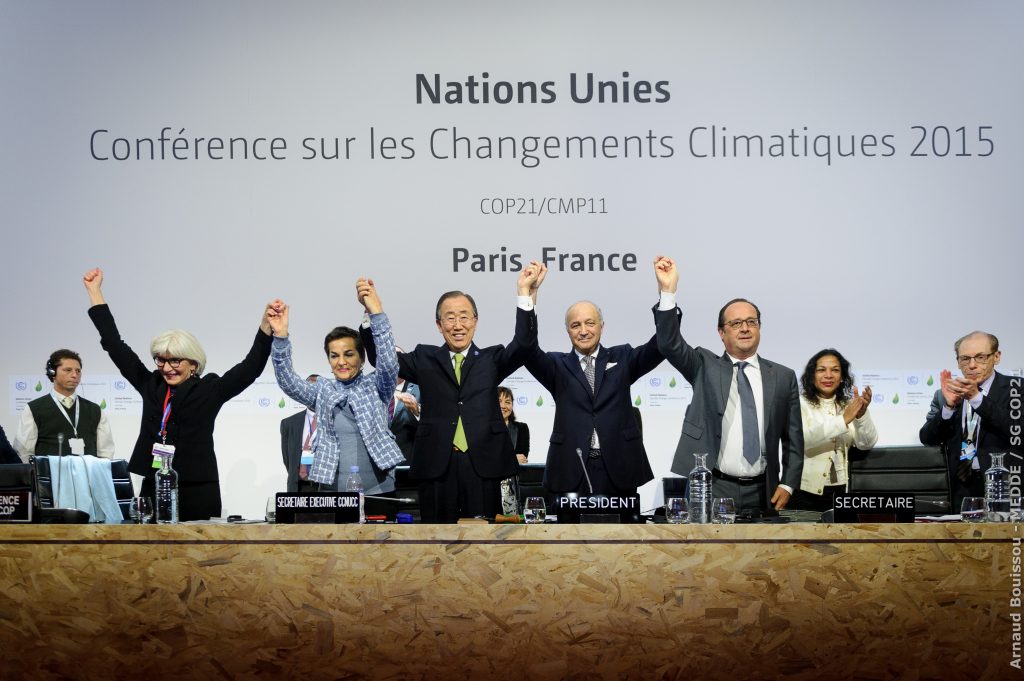Paris Agreement threshold may be breached in coming decades, new study finds

February 7th, 2018
A new study launched by seven research institutes in Europe and Turkey has found that the world will likely pass the 1.5C warming threshold in the next decades.
The Paris Agreement set two major temperature goals: a long-term goal of keeping the increase in global average temperature to “well below” 2°C above pre-industrial levels, and a second goal to limit the increase to 1.5°C.
The new report in the journal Earth’s Future finds that a 1.5C increase will bring a predicted doubling of heat waves in Southern Europe and the Mediterranean.
The new study analyzed potential impacts in areas such as temperature, rainfall, electricity demand, summer tourism, winter tourism and impacts on the ecosystem.

Paris Agreement March Photo: Eoin Campbell,
Potential Impacts in Europe
Regarding temperature, the study shows that the biggest rise will occur in North-Eastern Europe. During summer, mountainous regions such as the Alps and the Pyrenees will become hotter, together with the Iberian Peninsula, the Balkans and parts of Turkey.
Rainfall is expected to increase substantially in Northern and Eastern Europe, while a strong decrease in rainfall during summer is expected in the Iberian Peninsula, Southern France, the Balkans, and Turkey.
Heat waves and extreme summers will also become more common in Southern Europe and the Mediterranean, according to the study.
Changes in rainfall and the amount of water available are expected to affect several economic sectors, such as health, agriculture, tourism, and energy production, the study adds.
In Scandinavia, warming will be considerably higher than the global average and extreme rainfalls will become more common, the report finds.
Summer tourism might be negatively affected in Southern Europe and the Mediterranean due to the warmer temperatures, especially in Cyprus, Spain, Greece, and Italy.
Winter tourism and skiing are expected to decrease in Austria, Italy, and Slovakia with further increases in temperature. France and Switzerland could also be economically affected, though to a lesser extent.
Tourism may increase in Western Europe and the Balkans during the summer, the study finds, although the study does not factor in the potential impact of migration and falls in food production on tourism.

Conférence des Nations Unies sur les changements climatiques – COP21 (Paris, Le Bourget)
Impact in Ireland
According to the study, in the UK and Ireland, summer tourism is projected to increase, while heat waves are expected to occur in London every five years.
According to Professor John Sweeney, Ireland will also be affected in the coming decades and will be at least 0.5C warmer than 30 years ago. “Further warming to breach the 1.5C value is highly likely over the next 30 years,” the climate expert told The Green News.
He added: “Already we are seeing changes in the growing season, rainfall intensity, and the frequency of weather extremes of various kinds in Ireland. Further warming will likely exacerbate these changes further and impose substantial costs on the Irish taxpayer for adaptation to our changing climate.”
“Ireland’s continuing inaction and rising greenhouse emissions are increasingly damaging its international reputation in the Developing World as well as earning it a reputation within the EU as a climate laggard,” Prof Sweeney said.
[x_author title=”About the Author”]







